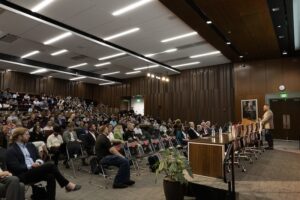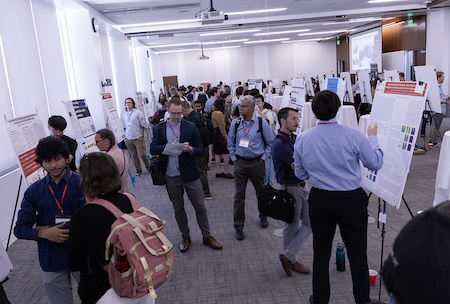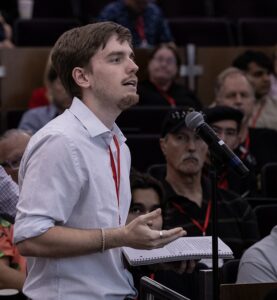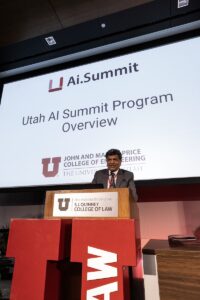 On June 18, the University of Utah’s John and Marcia Price College of Engineering hosted its first AI Summit for Utah, bringing artificial intelligence researchers from every department together for an all-day symposium. There, they connected with more than 400 faculty, students, industry partners, and policymakers from across the region.
On June 18, the University of Utah’s John and Marcia Price College of Engineering hosted its first AI Summit for Utah, bringing artificial intelligence researchers from every department together for an all-day symposium. There, they connected with more than 400 faculty, students, industry partners, and policymakers from across the region.
Charles Musgrave, Dean of the Price College of Engineering, kicked off the sold-out proceedings, held at the S. J. Quinney College of Law. As a chemical engineer, Musgrave has been using machine learning techniques for more than a decade in the pursuit of developing new materials. But from the vantage of Dean, and at the precipice of a new technological revolution, the prospects for artificial intelligence are limitless.
“Those who lead in AI, will lead in science, economics, national security, and innovation,” Musgrave said. But if we do it right, we’ll also lead in art, entertainment and personal fulfillment.”

Steven Price, member of the University of Utah Board of Trustees, also contributed opening remarks, detailing the ways university research redounded to the public’s benefit over the past decades. “These are the ingredients that fertilized Utah’s growth,” he said. “We’re in a movement and a moment. The movement is AI, and the moment is now. AI is moving fast and we have to move faster.”
In addition to a series of poster presentations by more than 60 students from across the state, the symposium was organized into four panels: “AI in Sensing, Seeing and Securing the World,” “Next-Gen AI: From Supervision to Autonomy,” “The Nexus of Health, Humans, and Machines,” and “‘Bridging’ AI and Infrastructure.” Each panel was bookended by a series of one-minute “lightning talks” from a selection of the student poster presenters, as well as Q&A sessions from the audience.
AI in Sensing, Seeing and Securing the World
Weilu Gao, ECE, Machine learning with optics
Ziad Al-Halah, KSOC, Multimodal Embodied AI
Guanhong Tao, KSOC, Towards Safe and Secure Large Language Models
In “AI in Sensing, Seeing and Securing the World,” moderator Varun Shankar, assistant professor in the Kahlert School of Computing, panelists engaged with the ways AI systems are increasingly integrated with physical ones. As such, these systems need new ways of sensing features of their environments and making sure they are interacting in ways that won’t harm the people in them. Gao’s work adds another dimension to this field; he and his colleagues recently published research on an “optical neural engine” that can potentially accelerate the computation involved in these applications.

Next-Gen AI: From Supervision to Autonomy
Jacob Hochhalter, ME, Reducing Training Costs with Derivative Informed Data from Hypercomplex Automatic Differentiation
Daniel Brown, KSOC, Toward Robust, Interactive, and Human-Aligned AI Systems
Vivek Srikumar, KSOC, Human language technology: Can we do better than bigger?
In this panel, moderated by Tucker Hermans, Associate Professor in the Kahlert School of Computing, the theme was the tradeoffs AI systems must make when it comes to the data they’re trained on. Many machine learning techniques rely on massive data sets, but not all applications have access to them, for practical, economic, or even legal reasons. Beyond reducing the upfront costs of training, new strategies for building up these models will have applications in low-resource and off-the-grid environments.
The Nexus of Health, Humans, and Machines
Tolga Tasdizen, ECE, Towards interpretable AI models in radiology
Neda Netagh, ECE, Toward less artificial intelligence
Alan Kuntz, KSOC, Autonomous Surgical Robots that Learn from Human Surgeons
Amir Arzani, ME, Scientific machine learning: From no data to large data
Ashley Dalrymple, BME, Reinforcement Learning for Predicting Walking-Related Events
Moderator Laura Hallock, assistant professor in Mechanical Engineering, continued the theme of AI’s integration into physical systems, in this case, biological ones. Healthcare applications hold some of the highest promise of AI systems, but technical and ethical issues abound. Panelists discussed automated analysis of medical images, the neuroscience of vision, physics-based models of blood flow and of tumor tissue, and the biomechanics of walking.
“Bridging” AI and Infrastructure
Ryan Johnson, CVEEN, High-Resolution Snow Mapping with Machine Learning: Pioneering Products to Enhance Season-to-Season Water Supply Forecasting
Masood Parvania, ECE, AI for Autonomous Power Grid Operation
Chenxi (Dylan) Liu, CVEEN, Leveraging AI for intelligent transportation systems
Taylor Sparks, MSE, The materials of tomorrow, today
In the final panel of the summit, moderator Cathy Liu, Associate Professor in the Department of Civil & Environmental Engineering, participants zoomed out to even larger physical systems: transportation networks and other pieces of civic infrastructure. Here, the multiplicity of inputs and complexity of their interactions are a natural fit for machine learning techniques. Panelists discussed digital twins of the electric grid for training against cyberattacks, the connection between winter snowfall and summer water levels, preventing chain-reaction crashes on highways, and how the materials that make up everyday life are now being invented with these technologies.

The Summit concluded with the announcement of the winners of the student poster and lightning talk competitions.
Lightning Talk Winners:
- John and Marcia Price College Third Prize: Sonny Jones
- The Google Second Prize: Wyatt Young
- The Cisco First Prize: Byron Millet
Poster Competition Winners
- John and Marcia Price College Third Prize: Atharv Kulkarni
- The Google Second Prize: Seongil Heo
- The Cisco First Prize: Hasan Muhammad Sayeed
- H.E. Thomas People’s Choice winner: Mohammad Mohammadi
Sneha Kasera, Associate Dean for Academic Affairs, had final words for attendees.
“Through this AI Summit, we hope to strengthen existing partnerships and also build many new ones towards the goal of achieving excellence in AI research and education,” he said.